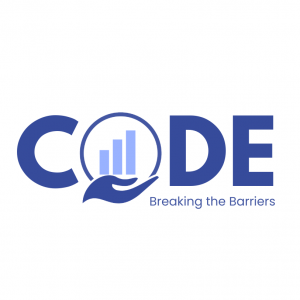Project title:
CODE – aCcessibility Of financial services for persons withDisabilitiEs
Foster social and financial inclusion through strategic partnership. Promoting joint initiatives among stakeholders based on the exchange of good practices and skills.
Project duration:
01.12.2023. – 30.11.2026.
Partner organisations:
Chambre de Commerce Italienne de Nice (COO) – ITALY
FondazioneIstitutodei Sordi di Torino ONLUS – ITALY
Fondazione Luigi Clerici – ITALY
Cooperation Bancaire Pour L’europe – BELGIUM
Atlantis Engineering S.A. – GREECE
Association De Patronage De L’institut Regional Des Jeunes Sourds Et Des Jeunes Aveugles De Marseille – FRANCE
Fundacio Privada Trinijove – SPAIN
People First Közhasznú Egyesület Pécs – HUNGARY
Financial inclusion is a challenge facing most EU countries. It was therefore essential to establish a broad transnational cooperation involving 8 relevant organisations from 5 different countries. In this way we are trying to enable this socio-economic challenge to be overcome.
Project summary:
The project aims to provide persons with disabilities with guidance to better access financial services and documents, and to adjust the financial services and products currently available to their needs.
Target groups of the project:
– persons with disabilities: the project aims to facilitate their understanding of the financial and banking sector through financial literacy training on the types of products and services available to them. The target group will be able to access the training materials through a web platform and related application.
– reaching the target group is also helped by the involvement of disability support networks and vocational training centers. These networks can benefit from the professional materials created and offer new services and support tools. At the same time, they can acquire new skills and knowledge in this field.
– vocational training trainers/instructors and service providers: they will have access to innovative training on access to financial services for people with disabilities. This will allow them to expand their course offerings in this direction.
Indirect target groups:
– financial institutions and banks, for whom the guidelines on the accessibility of financial services are useful information. This will enable them to design and implement more accessible services for all, while broadening their audience and reaching target groups that they have not yet reached. At the same time, managers and staff can acquire new skills through the project.
– SMEs (small and medium sized enterprises) and chambers of commerce, be able to develop good practices for integration in the workplace, learn about and apply good practices.
– political decision-makers who can further reflect on its social use by learning from the good practice training programme on financial inclusion for people with disabilities.
Involving target groups is a key element of the project, so stakeholders are involved in the national teams from the start as focus groups, brainstormers and testers.
Project outputs:
The innovation of the CODE project is that it promotes the application of the universal design model and social inclusion to the financial, banking, insurance and business environment. CODE is a pilot project that aims to enhance financial literacy among people with disabilities.
It will foster inclusion of the target group in the financial system and access to financial products/instruments by the collection and sharing of best practises of inclusion at EU level (IO1) and the creation of an interactive map for users i.e. a platform and an app that everyone can use (IO2). The project will finally create a new training course composed of modules and guidelines to be used by trainers and people with disabilities to deal with banking institutions (IO3).
The main task of People First Association as a Hungarian partner in the project is:
As in all international projects, our main task is to promote the principle of “Nothing about us without us”. In addition, our main tasks are the design and development of the CODE inclusive platform in the framework of the training course and digital tools, in cooperation with the Greek partner. And in the framework of the piloting of the course, the final fine-tuning of the materials developed with the help of our association members.
👉Follow us on Facebook too: CODE project

